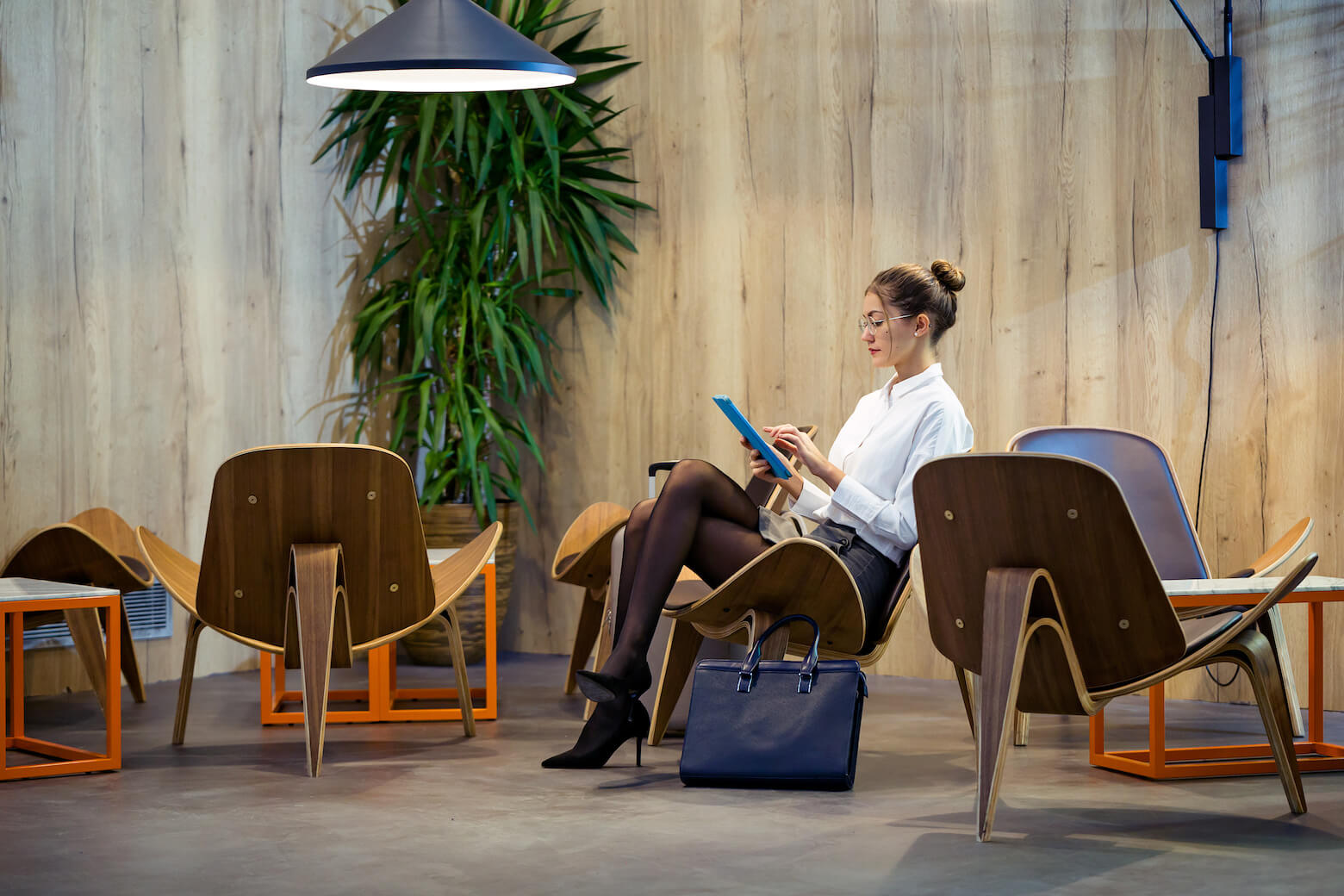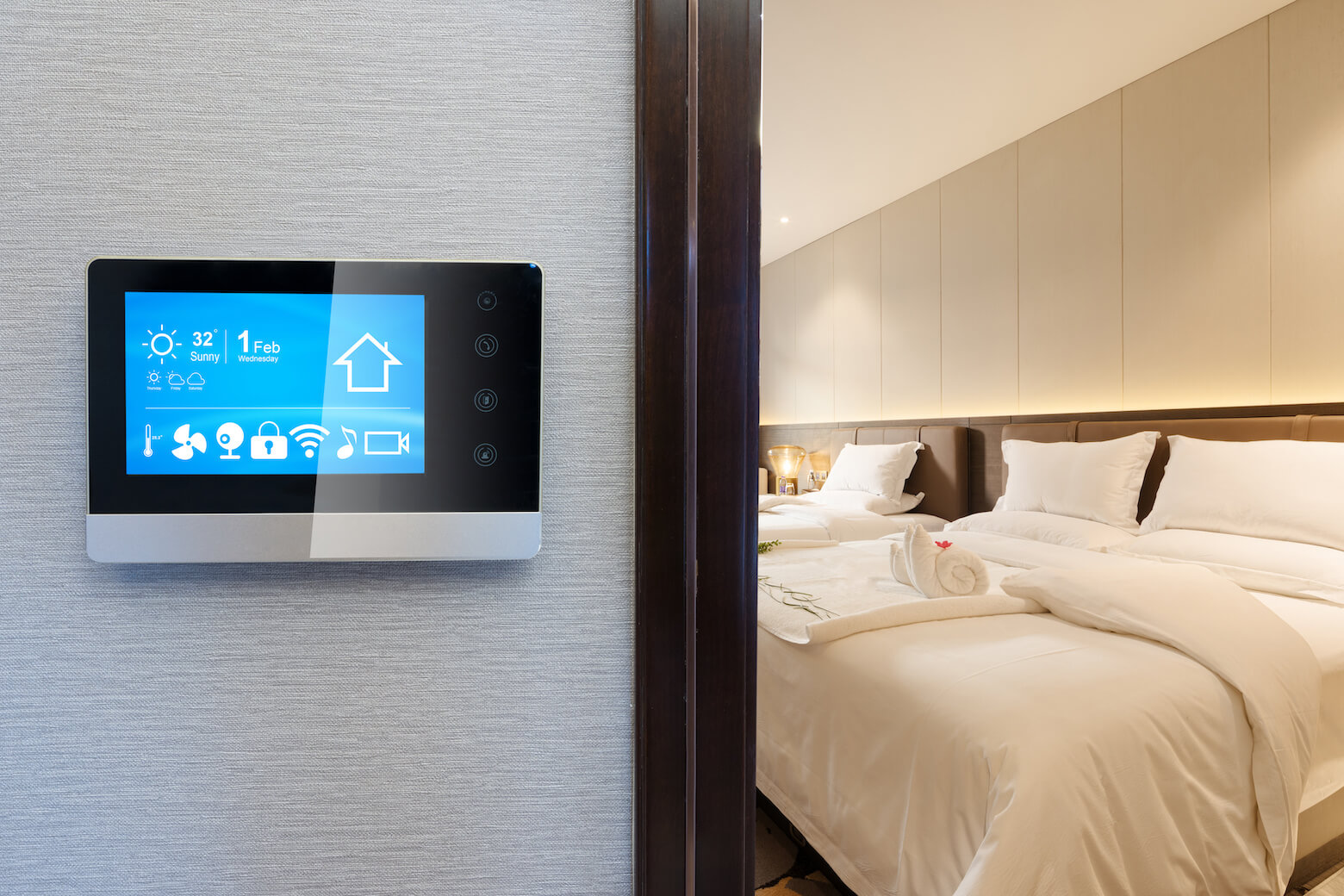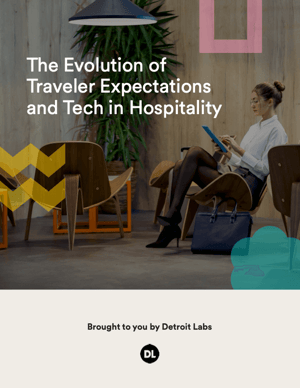Scroll down to read or save a copy.

The hospitality industry has to change. That isn’t just a call for action—it’s a blanket statement driven by consumers’ changing values and the emerging post-pandemic culture. Modern hotels need to be more than just warm beds and complimentary breakfasts. They need to be sustainable, comprehensive experiences complete with integrated technology.
But why fix it if it’s not broken? Because travel has shifted, and people interact with the world differently now. Everyone has a computer in their pocket and can find the best solution to meet their needs in just a few taps.
The COVID-19 pandemic slowed industry change, but not substantially. According to an analysis for the American Hotel & Lodging Association (AHLA) by Oxford Economics, the hotel industry is on pace to see revenue nearly return to what it was in 2019. However, it’s more challenging than ever to get heads in beds in an increasingly oversaturated market. Newer players like Airbnb meet technological and human needs with ease, providing travel autonomy and control enhanced by the best tech solutions. Traditional hotels are playing catch up.
But that doesn’t mean you’re stuck.
Let’s look at how the guest experience is shifting and how hospitality technology can help you keep up.

Travelers have high expectations. They make a sizable investment when booking a trip, so they only want the best. As a result, hotels need to make the experience seamless. That means deepening their relationship with travelers.
Think of it like the current employment renaissance. Just like employees expect more than happy hours and foosball tables, travelers want more than free parking, complimentary cereal, and loyalty points.
A clean bed in a safe environment is no longer the standard for guest needs. Just look at how customer expectations have shifted:
Yesterday's Essentials
Today's Requirements
Guests are looking for meaningful experiences in which they are heard, engaged, empowered, and delighted through an intelligent mixture of customer service, technology, and community. Hotels need to change the rules of the game and rethink hospitality beyond accommodating short-lived trends.

You can’t just flip a switch and change your hotel’s business model—it takes work. Brands and their owners need to realign goals to diversify their customer base and reach.
Extensive brand requirements inhibit opportunities to embrace community and the shift toward a customer focus. Instead of following the old-school script, you need to examine how your venues can democratize decision-making, from changing the hotel environment to shifting the networking opportunities you provide.
So how do you truly begin to change your venue’s approach? By meticulously considering the guest’s journey:
“I feel like you don’t even know me.” If that’s the impression you give customers, you need to pivot your approach. This part of the guest journey builds the foundation of your brand’s relationship with customers.
Know Me is the art of knowing and remembering guest preferences and needs. It’s an essential starting line for a positive guest journey because guests want to interact with brands that care about their preferences.
Guests are happier when they feel engaged. This focuses on how the hotel team engages with guests in a personalized, authentic, and attentive way. Sharing that positive energy does matter, especially in determining whether or not guests become advocates or enemies.
Guests are more likely to promote a hotel when its teams:
“This is a space where I feel heard.” Now we focus on the ways hotels listen to guests’ needs, empathize with their situations, and then follow through to deliver what they want. It’s especially important when something goes wrong and your hotel has a service recovery opportunity.
Feeling heard is easily the most important element for guests, but that doesn’t mean all hotels answer the call. And that’s certainly a missed opportunity, as guests are more likely to positively and organically promote their experience when their concerns are fixed quickly.
The power is yours. (Cue the Captain Planet music.) Next-generation guests require flexibility and access that lets them shape their experience when and how they want.
A hotel can enable guests to access tailored recommendations and reservations for everything from ground transportation to local activities and restaurants. When you deploy a seamlessly integrated recommendation engine such as an app or dedicated portal, you make it easy for guests to get what they want practically on demand.
Again, it’s not enough to just give customers what they want. To shine in their eyes, you need to surprise and delight them. A hotel creates moments that surprise guests and exceed their expectations. We’re not talking pillow mints; more like in-room artificial intelligence (AI) features. Going the extra mile with simple touches that are unexpected, tailored, and delivered in ways guests do not anticipate creates a lasting impression.

Due to the changing market and guest requirements, technology is poised to be a force within the hospitality industry. However, it hasn’t kept pace with innovation and consumer expectations—such as the disparity in native mobile offerings—so there’s a ton of work to do.
Let’s dial it back a second. The guest experience starts with guest knowledge, right? Because of this, hotels need to embrace cognitive capabilities—that is to say, the potential of data and technology—and develop a partnership ecosystem.
It doesn’t mean you’re smarter, but having a cognitive advantage does mean you trust technology to be smart for the benefit of you and your guests. Hotels can build a cognitive advantage by combining big data with cognitive computing to enhance decision-making, improve operations, and elevate the guest experience. One approach is to take advantage of predictive insights.
Example: Instead of creating lengthy guest notes, use predictive insights extracted using data from the reservation, your loyalty program, and even social media.
You could also go the automation route, using intelligent agents and avatars to deliver personalization at scale.
Example: Generate personalized recommendations for guests and deploy digital assistants to interact with them, whether it’s for food delivery, parcel delivery, or check-in.
Your guests don’t rely on you for entertainment like they used to, instead choosing to peruse social media or stream on Spotify or Apple TV. This is where you can take advantage of an emerging partnership ecosystem powered by digital engagement.
Thanks to mobile phones, guests aren’t limited by hotel offerings. Think about the 90s, when just about every hotel offered pay per-view. Today, the primary offering is free Wi-Fi, turning your venue into an “enabler” instead of a provider in a partnership ecosystem.
Guests also enjoy being in the driver’s seat. Late-night cravings? Customers want access to information about local restaurants, but they don’t want to be limited to room service or a one-sheeter of pizzeria phone numbers. In a partnership ecosystem, you can deliver what guests want through business partnerships and technology:
As guests’ standards continue to rise, hotels can respond with technological solutions to serve their needs.

Technology in hospitality can connect the community, hotels, and guests in new ways. Maybe you establish partnerships to offer new experiences that evolve with guests, such as personalized recommendations based on customer data and preferences. Or perhaps you redesign your app or website and segment the UI/UX based on the customer personas that use your economy or luxury brands.
But let’s not forget the changing employment landscape. Deploying technologies that facilitate remote work and business travel—such as videoconferencing and smart whiteboards—enhances hotel success. You can also make it easier for guests to reserve and access a meeting space by allowing them to do it all from their mobile devices.
There are endless opportunities for technology to elevate the guest journey and make guests feel like you know them, engage with them, hear them, empower them, and delight them. Your hotel app alone is both a virtual concierge and logistics guru, capable of assisting with guest needs while still putting them in control. Using your app, guests should be able to:
Your guests demand more, and it’s time to step up. Since the beginning of the pandemic, customers have adapted to–and now expect–digitized experiences.
